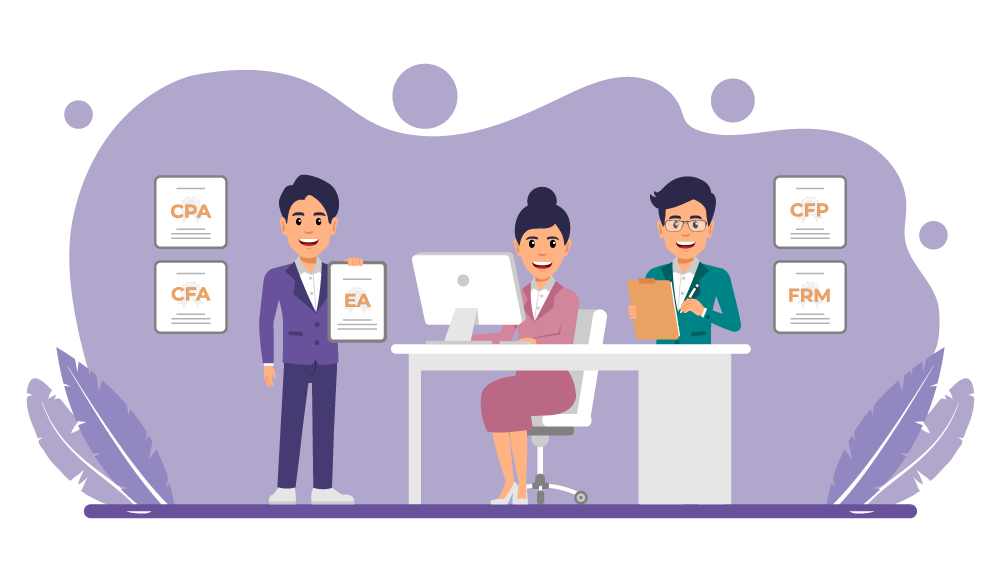If you want to make some extra money during tax season, becoming a tax preparer is a great idea. This can also be a full-time career, but many tax preparers do the majority of their work during tax season.
As a tax preparer, you will be trained to help businesses and individuals. You will help them get the best possible return or pay in the least amount possible. Let’s look at the job duties of a tax preparer and how you can become one.

Job Duties of a Tax Preparer
Your main job duty, as a tax preparer, will be to prepare the necessary tax forms for clients. You will also submit these forms to the Internal Revenue Service (IRS) on behalf of your clients.
Many tax preparers work with both individuals and businesses. Others specialize in one or the other. Along with preparing forms, many tax preparers will also provide some financial help for clients. Some of the most common job duties of a tax preparer include:
- Helping individuals by using federal, state, and local tax codes
- Preparing and filing tax returns for clients
- Signing income tax returns on behalf of businesses and individuals
- Providing an invoice for the preparation fee
- Calculating taxes owed or returns based on the current tax codes
- Advising clients based on tax liability
- Auditing tax forms for accuracy
You may have other job duties, as well, depending on your employer.
How to Become a Tax Preparer in 4 Steps
Step #1 – Finish High School or Get a GED
No matter the type of tax preparer you plan to become, you will need to complete high school or get a GED. Many tax preparers will go on to college, which means doing well in high school is a good idea. With good grades and high SAT or ACT scores, you can get into a better college degree program.
Step #2 – Complete the Correct Training
For some types of tax preparers, such as CPAs or tax attorneys, an advanced degree will be necessary. Others will simply need to complete the right courses from a community college or vocational school.
The National Association of Tax Professionals will likely offer accredited courses in tax preparation. These courses will help you understand how to fill out the forms properly, conduct a taxpayer interview, and calculate refunds.
Step #3 – Get Your ID Number from the IRS
As a tax preparer, you will need a Preparer Tax Identification Number or PTIN. This number comes from the IRS. You will need to fill out an application with your personal information to get this number.
Once your application is approved, you will get a certification as an unenrolled preparer. This status allows you to fill out and fill basic tax returns for businesses and individuals.
If you plan to start a tax preparation business, you will need to get an Electronic Filing Identification Number or EFIN. This comes from the IRS and will require a criminal and credit background check. Once approved, you will be able to e-file tax returns for clients.
Step #4 – Get Your Tax Preparer License
In some states, you will need to get a tax preparer licensed. These states include California, Connecticut, Maryland, Nevada, New York, and Oregon.
You may need to take additional courses to qualify for a license. Some states will also require you to complete continuing education every year to keep your tax preparer license.
Types of Tax Preparers
You can become one of many different types of tax preparers including:
- Certified Public Accountant (CPA) – As a CPA, you can work alone or for an employer. you will need to pass the state exam to become a CPA. Most CPAs work with all types of clients to help with filing taxes, along with other financial things, such as retirement savings and business sales.
- Enrolled Agent – As an enrolled agent, you will have a license from the IRS. This license requires passing a very difficult exam. However, once you pass, you will be able to represent your clients in court when their taxes have been challenged by the IRS. Most agents can work all across the nation without restriction.
- Tax Attorney – If you have a law degree, you can become a tax attorney. This type of tax preparer will work for larger businesses. You will represent the business when they need to go to court over a tax issue.
- Non-Credentialed Tax Preparer – In many states, you don’t need any credentials to become a tax preparer. As a non-credentialed tax preparer, you can work for a large tax preparation company as a seasonal employee. You will likely work from January through May helping clients fill out tax forms.
Common Skills You Need to Become a Tax Preparer
No matter the type of tax preparer you become, you will need the right skills. While you can gain the training you need, some of the skills you should develop include:
- Customer Service Skills – You will be working with a variety of clients. Developing good customer service skills is necessary for this career.
- Active Listening Skills – It’s necessary to listen to your clients to accurately complete their tax forms.
- Time Management Skills – The tax season can get very busy. You will need to manage your time properly to maximize the number of clients you can handle.
- Organizational Skills – Staying organized is vital when preparing taxes.
- Attention to Detail – Of course, you must fill out tax forms accurately. Great attention to detail is necessary for this job.
These skills are very important if you want to become a tax preparer. Work on developing your skills as you go through the training for this career.
Frequently Asked Questions About Becoming a Tax Preparer
How much can I make as a tax preparer?
While the average salary for a tax preparer can vary greatly, non-credentialed tax preparers often make about $16.56 per hour, according to Indeed.com. Some tax preparation firms pay much higher amounts, especially if you have additional training.
If you work in New York, Las Vegas, Atlanta, or Chicago, you will likely make above the average amount. These are the highest-paying locations for tax preparers.
What type of benefits will I get as a tax preparer?
If you only work seasonal, you will likely not gain access to many benefits. However, you might still get the ability to work from home and gain bonuses through a referral program. Those working full-time may also get a 401(k), health insurance, life insurance, paid time off, and many other benefits.
Do I need a degree to work as a tax preparer?
No, in most cases a college degree isn’t necessary. You will need to complete high school or get your GED, however. Additional tax preparation courses may also be necessary and you will need a PTIN number from the IRS. However, if you have a bachelor’s degree you may earn a higher salary.
Where can I get experience working as a tax preparer?
Many entry-level tax preparer jobs are found at tax attorney offices, accounting firms, and tax preparation chain locations. It’s common to gain experience working during tax season for one of the larger tax preparation firms.
Are there any advancement opportunities for tax preparers?
Yes, if you start as an unenrolled agent, you can pursue a career as an enrolled agent. This allows you to earn more money after completing the necessary training. It’s also possible to go into business for yourself as a tax preparer.
What are the different titles used for tax preparers?
If you become a tax preparer, you might not be called a tax preparer. Instead, you might work as one of the following:
- Tax advisor
- Tax specialist
- Enrolled agent
- Income tax preparer
- Unenrolled agent
- Licensed tax consultant
- Income tax consultant
- Corporate tax preparer
These titles are all used for different kinds of tax preparers.
What types of tax forms will I prepare for my clients?
When you become a tax preparer, you will likely use Form 1040 quite often. This is the most common form for individual tax returns. It’s also common to use Form 1120, as this is the form used for corporate tax returns. You may also need to interpret partnership agreements often if you prepare taxes for businesses.
Where do I find a job as a tax preparer this tax season?
Most of the tax preparer jobs will be found with larger tax preparation firms. You can also work freelance for yourself as a tax preparer. Accounting firms and law firms will also provide some job openings during tax season. It’s easy to find these job openings listed on major career websites.
If you’re looking to boost your income during tax season, becoming a tax preparer is a great option. It can also become a full-time job if you get the right training. Use the steps outlined in this article and you can get the necessary training to become a tax preparer.




